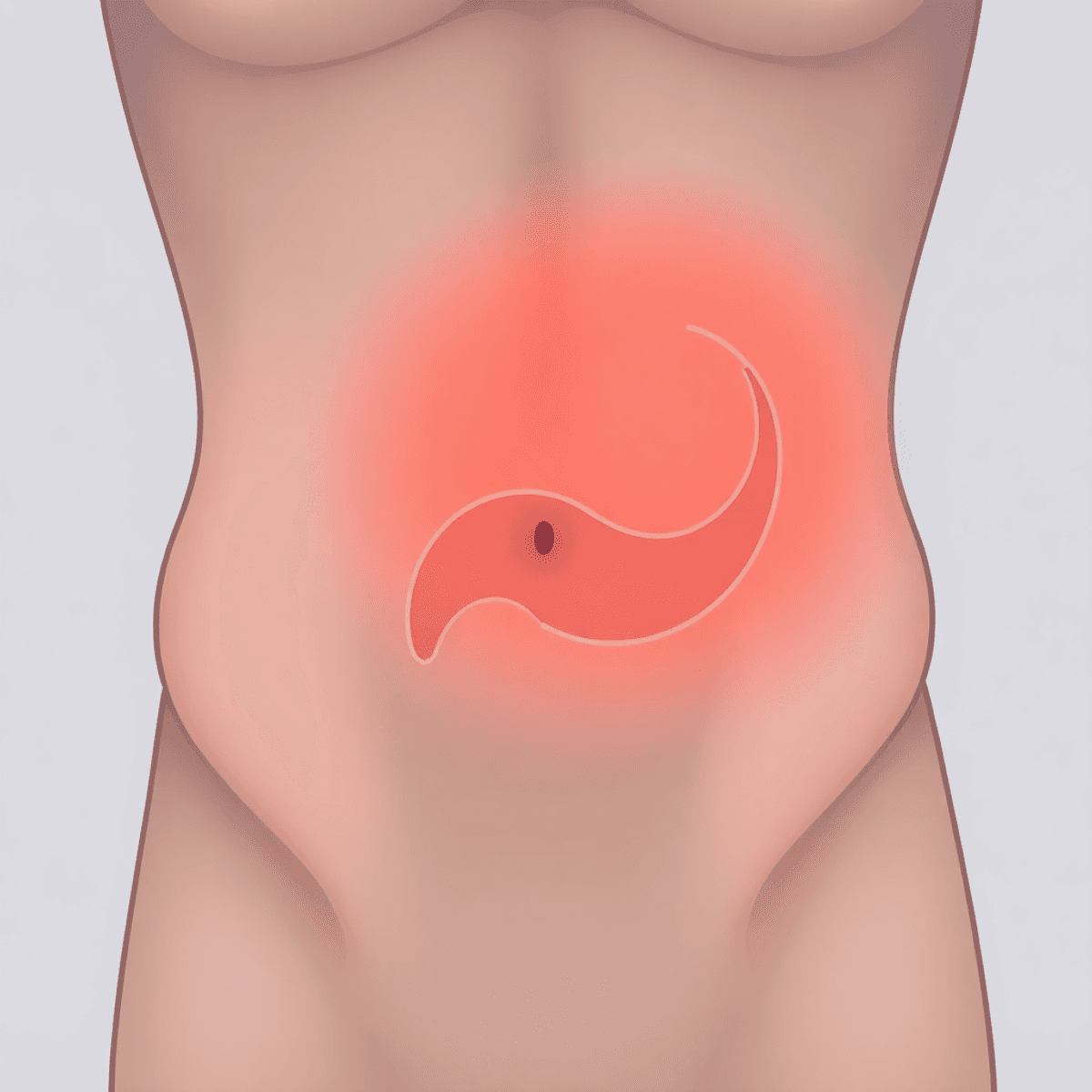Living with anxiety can trigger physical symptoms that go beyond mental distress. One common manifestation is anxiety stomach pain – a real, tangible discomfort that affects many people dealing with anxiety disorders.
Anxiety stomach pain creates distinct physical sensations in your digestive system:
- Intense cramping
- Persistent bloating
- Churning or knotted feeling
- Nausea
- Changes in bowel habits
Understanding these symptoms helps you recognize when anxiety might be the root cause of your stomach discomfort. This awareness is crucial – it empowers you to differentiate anxiety-related pain from other medical conditions and seek appropriate treatment.
Your body’s stress response system directly influences your digestive health. When anxiety strikes, it can set off a chain reaction in your gut, leading to uncomfortable physical symptoms that might intensify your emotional distress. Recognizing this connection marks the first step toward managing both your anxiety and its physical manifestations effectively.
However, if you’re experiencing prolonged digestive issues, such as persistent bloating or changes in bowel habits, it may be worthwhile to explore potential underlying causes or consider consultations with healthcare professionals. For instance, medications like Ozempic and Phentermine are often used for weight management and can have side effects impacting digestion.
It’s also important to note that certain medications could potentially lead to gastrointestinal issues. For example, while Ozempic is effective for weight loss and diabetes management, it has been linked to some serious bowel injuries in rare cases. Therefore, understanding the key differences between Ozempic and Jardiance, another diabetes medication, could provide valuable insights if you’re considering switching from one to the other.
The Brain-Gut Connection: How Anxiety Affects Your Digestive System
Your gut and brain maintain constant communication through a complex network called the enteric nervous system. This connection explains why you might feel “butterflies” in your stomach during stressful situations or experience digestive issues during anxiety episodes.
How the Brain-Gut Axis Works
The brain-gut axis operates through several pathways:
- Neural Pathways: Direct nerve connections between your brain and digestive system
- Hormonal Signals: Chemical messengers that regulate digestion and stress response
- Immune System Components: Cells that influence both gut health and emotional well-being
The Impact of Anxiety on Digestion
When anxiety strikes, your body releases stress hormones, particularly cortisol. These hormones create significant changes in your digestive system:
- Increased stomach acid production
- Altered gut muscle contractions
- Disrupted digestive enzyme release
- Changes in blood flow to digestive organs
- Imbalances in gut bacteria composition
Physical Reactions in the Digestive System
Your body’s stress response can trigger physical reactions in your digestive system:
- Slowed Digestion: Leading to bloating and constipation
- Rapid Gut Movement: Causing diarrhea and urgent bathroom needs
- Increased Sensitivity: Making your stomach more reactive to normal digestive processes
The intensity of these symptoms often correlates with your anxiety levels. Chronic stress can create a cycle where digestive discomfort triggers additional anxiety, perpetuating both physical and emotional symptoms.
Potential Solutions for Digestive Issues
In such situations, exploring dietary changes or fasting methods like the 96-hour fast could potentially help alleviate some of these digestive issues by giving your system a break.
Moreover, considering the psychological aspect of these symptoms, treatments such as ketamine therapy have shown promise in quickly reducing anxiety levels for some patients.
Also, incorporating certain foods or drinks like butterfly milk, known for its health benefits including antioxidants which can aid overall well-being, might be beneficial during stressful times.
Lastly, if you are managing chronic conditions like diabetes alongside these anxiety-induced digestive issues, it’s crucial to be mindful of your snack choices. Our comprehensive guide on healthy snacks for diabetes provides valuable insights on this topic.
Common Sensations Experienced During Anxiety Stomach Pain Episodes
Anxiety stomach pain shows up as specific physical feelings that can vary from mild discomfort to intense distress. Here’s what you might go through during an episode of stomach pain caused by anxiety:
Primary Physical Sensations:
- A tight knot in your upper abdomen
- Sharp, stabbing pains that move around your stomach
- Persistent aching or cramping in your lower abdomen
- Heavy pressure or squeezing sensations
- Bloating that makes your stomach feel distended
Associated Digestive Symptoms:
- Burning sensation similar to acid reflux
- Gurgling or churning stomach sounds
- Gas and belching
- Nausea that comes in waves
- Loss of appetite or sudden hunger
- Loose stools or urgent bowel movements
The intensity of these symptoms can vary throughout the day, often becoming more pronounced during stressful situations. You might notice these sensations appearing suddenly without warning or building gradually over time. Many people describe the feeling as a “butterflies in stomach” sensation that transforms into physical discomfort.
The combination of these symptoms can create a cycle where physical discomfort triggers additional anxiety, intensifying both the emotional and physical responses. Your stomach might feel sensitive to touch, and normal activities like eating or moving around could temporarily worsen the discomfort.
In such cases, it’s essential to consider [building a balanced diet](https://wellnesshq.net/health-news-research/building-a-balanced-diet-essential-tips-for-optimal-health) which could help manage some of these digestive symptoms. Incorporating healthy choices into your meals may ease the bloating and other discomforts associated with anxiety.
Moreover, [regular exercise](https://wellnesshq.net/mental-health-wellbeing/top-benefits-of-regular-exercise-for-mental-health-what-you-need-to-know-2) is known for its top benefits on mental health, which could potentially alleviate some anxiety levels over time.
If dietary changes and exercise don’t yield the desired results, you might want to explore medical options such as Sublingual Semaglutide, which is a new era in diabetes management but also promotes weight loss effectively.
Finally, if you’re considering dietary strategies like intermittent fasting, recent research reveals its potential positive impact on metabolic health which might also assist in managing anxiety-related stomach issues.
Managing Anxiety-Related Stomach Pain Effectively Through Lifestyle Changes and Therapies
Taking control of anxiety stomach pain starts with implementing effective stress management techniques. Here are proven methods to help you manage your symptoms:
Mindfulness Meditation
- Practice daily 10-minute meditation sessions
- Focus on breathing and body awareness
- Use guided meditation apps for structured sessions
- Create a quiet, comfortable meditation space
Breathing Exercises
- Try the 4-7-8 breathing technique
- Practice diaphragmatic breathing
- Incorporate box breathing during stress peaks
- Set breathing exercise reminders throughout your day
Professional Support
Cognitive Behavioral Therapy (CBT) offers structured approaches to managing anxiety:
- Identifying trigger situations
- Developing coping strategies
- Challenging negative thought patterns
- Learning stress management techniques
Additional Lifestyle Changes
Implementing a balanced diet rich in fiber can significantly improve your overall health and help alleviate some anxiety-related symptoms.
Regular physical exercise (30 minutes daily)
Adequate sleep (7-9 hours) – consider exploring strategies for better sleep quality
Stress-reducing activities like yoga or tai chi
It’s also crucial to maintain proper hydration, which plays a vital role in overall health, from cognitive performance to weight management.
Working with a mental health professional can help you develop personalized strategies for managing anxiety-related stomach pain. These professionals can guide you through specific CBT techniques and help you create a tailored treatment plan that addresses both physical and emotional symptoms.
Additionally, if you’re facing issues such as constipation due to gut microbes, understanding the hidden causes and effective treatments for Intestinal Methanogen Overgrowth could be beneficial.
When to Seek Medical Help for Anxiety Stomach Pain: Knowing the Warning Signs
While anxiety-related stomach pain is common, certain symptoms require immediate medical attention. Here are critical warning signs that signal the need for professional evaluation:
Red Flag Symptoms
- Severe, persistent pain lasting several hours
- Blood in stool or vomit
- Unexplained weight loss
- High fever
- Difficulty swallowing
- Persistent vomiting
- Intense pain that wakes you from sleep
Changes in Bowel Habits
- Chronic constipation or diarrhea
- Black, tarry stools
- Significant changes in stool color or consistency
Your healthcare provider can determine if your symptoms stem from anxiety or indicate other underlying conditions like:
- Inflammatory bowel disease
- Ulcers
- Gastrointestinal infections
- Celiac disease
- Food intolerances
For instance, gut microbes could be a hidden cause of constipation, which may need specific treatments.
Documentation Tips
Keep a symptom diary before your appointment:
- Record pain intensity levels
- Note timing and duration of episodes
- Track potential triggers
- List accompanying symptoms
- Document dietary changes
Remember: Chronic anxiety stomach pain can impact your quality of life. Don’t hesitate to seek professional help if your symptoms interfere with daily activities or cause significant distress. You might also want to consider lifestyle changes such as adopting a plant-based diet which can offer long-term health benefits.
FAQs (Frequently Asked Questions)
What does anxiety stomach pain feel like?
Anxiety stomach pain often feels like cramping, bloating, indigestion, nausea, and sometimes diarrhea. These sensations are common during episodes of anxiety-related discomfort in the digestive system.
How does anxiety affect the digestive system?
Anxiety affects the digestive system through the brain-gut connection. Stress hormones such as cortisol impact digestion by altering gut function, which can lead to symptoms like stomach pain, cramping, and indigestion.
What are common symptoms experienced during anxiety stomach pain episodes?
Typical symptoms include cramping, bloating, indigestion, nausea, and sometimes diarrhea. These sensations reflect the body’s response to stress and anxiety affecting the digestive tract.
How can I manage anxiety-related stomach pain effectively?
Managing anxiety-related stomach pain can be achieved through lifestyle changes and therapies such as relaxation techniques including mindfulness meditation and breathing exercises. Counseling and cognitive behavioral therapy (CBT) also play a significant role in reducing anxiety symptoms and alleviating stomach discomfort.
When should I seek medical help for anxiety stomach pain?
You should seek medical evaluation if your stomach pain is persistent or severe. Warning signs include ongoing discomfort that doesn’t improve with relaxation techniques or worsens over time, indicating the need for professional healthcare assessment.
Why is it important to recognize and understand anxiety stomach pain symptoms?
Recognizing and understanding anxiety stomach pain symptoms is crucial because it helps differentiate between anxiety-related issues and other medical conditions. Early awareness enables effective management through appropriate therapies and prevents unnecessary distress.






